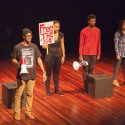Diversity forum brings Hmong history to forefront
Hmong-Americans want to promote a broader understanding of their culture and greater recognition of their struggles as a people, an international expert told the Plan 2008 Diversity Forum held Sept. 28 at UW–Madison’s Memorial Union.
“It’s a story of extraordinary tragedy over the years,” said Jane Hamilton-Merritt, who was the keynote speaker at the event. “The Hmong sacrificed much. They did it with great honor, and dignity-proud to be a part of this effort for freedom. They believed the U.S. was the greatest place on Earth. They believed the U.S. and the Hmong would be friends forever.”
Hamilton-Merritt, a photo-journalist, human rights activist and expert on Southeast Asia, was nominated for a Nobel Peace Prize in 1998 and again in 2000 for her work on behalf of the Hmong tribal people of Laos.
Her most recent book, “Tragic Mountains: The Hmong, The Americans, and The Secret Wars for Laos, 1942-1992” (Indiana University Press), was published to acclaim and selected as a finalist for the Los Angeles Times Book Award in History.
“I was very motivated by her as an American, willing to study the Hmong and know who we are,” said audience member Jeng Tongvue, 25, a Hmong member of the Madison community. “She’s a very motivating, inspiring person.”
Hamilton-Merritt opened her speech by asking the question, “Why am I here today? Why are their so many Hmong in Wisconsin?
“I’m here today because I was a war correspondent,” Hamilton-Merritt responded to her own question. “I went to war with my generation.”
Hamilton-Merritt was involved in Hmong politics during the “Secret War”; she described a covert, secret operation in Laos taking place near the end of the Vietnam War. “I did try to cover the story in Laos,” she said. “And I got in terrible trouble.” She lived for years and months in Thailand, waiting to capture the experiences of Hmong survivors as they fled the country.
“They did survive, they were tough,” Hamilton-Merritt said about the Hmong she encountered after the war. “They wanted to world to hear them.” Today, she said the Hmong people, having come to the United States, want to be recognized for their culture and their past struggles.
“The American people just don’t understand who we are,” agreed Tongvue. “They don’t recognize us as people, for our efforts in the war.” Tongvue spent time at a refugee camp in Thailand, one that Hamilton-Merritt presented pictures of during the presentation.
To address the growing interest in Hmong studies, UW–Madison is planning to build up its curriculum in Hmong culture and studies. The university has hired an instructor to teach the Hmong language and, a group of faculty and staff have created a proposal for a Hmong studies program.
“Given the size and influence of the Hmong population in Wisconsin, it makes sense for the state’s flagship university to take a leading role in spreading knowledge about the Hmong culture,” said UW–Madison Chancellor John Wiley.
At the end of her speech, Hamilton-Merritt invited Hmong audience members to join her on the stage for a moment of recognition.
“Let us become engaged. Let us change our attitude,” she said, closing the presentation. “Let’s change our compassion for a very special group of people.”


